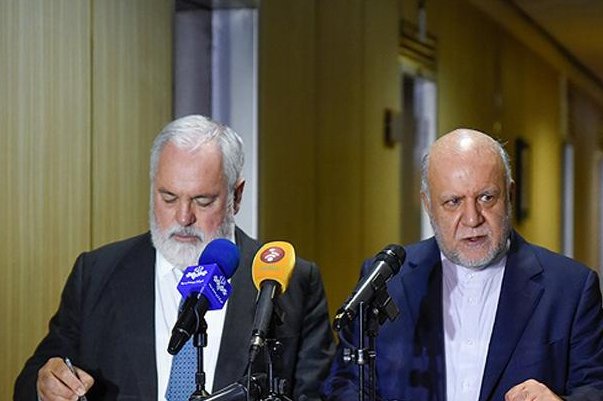Iranian Oil Minister Bijan Zangeneh (R) met European Energy Commissioner Miguel Arias Cañete during the weekend to review a relationship in the wake of the U.S. decision to back out of a U.N.-backed nuclear agreement. Photo courtesy of Reza Rostami/SHANA
May 21 (UPI) -- It may be difficult for Tehran to continue pursuing oil production benchmarks in the face of possible sanctions pressure, the Iranian oil minister said.
Iranian Oil Minister Bijan Zangeneh met during the weekend with European Climate Action and Energy Commissioner Miguel Arias Cañete to discuss continuing a relationship in the wake of fractures in the Joint Comprehensive Plan of Action.
U.S. President Donald Trump withdrew from the JCPOA on May 8, signing legislation that set a 180-day clock ticking on the U.N-backed agreement that gives Iran waivers from oil-related sanctions in exchange for nuclear commitments. Trump said the agreement was flawed, but European leaders maintain it's essential for peace.
Eventually, Trump's decision could limit as much as 1 million barrels of Iranian barrels on the market. French energy company Total has said already that it would have to reconsider its relationship with Iran given the renewed threat of sanctions.
Zangeneh said oil clients in India and China have yet to express reservations, though ambitions to reach 4.2 million barrels in daily production could be out of reach.
"That would be difficult but we would not put that aside," he was quoted by the ministry's news website, SHANA, as saying. "It might take more time, but we will not do away with it."
Secondary sources reporting to economists at the Organization of Petroleum Economic Countries estimated that Iran produced 3.8 million barrels per day on average last month.
Cañete in his statement said both sides would strengthen ties "at all levels." Iran has been working since the JCPOA was signed in 2015 to regain a market share lost to sanctions.
Analysis emailed to UPI from consultant group Verisk Maplecroft said European investors may be faced with making a choice between siding with Iran or the United States, the world's largest economy. Torbjorn Soltvedt, the principal regional political analyst for the group, added that it may be difficult for the remaining JCPOA members to counter U.S. sanctions.
The European Commission last week introduced measures that could mitigate the impact. China, one of Iran's largest oil consumers, meanwhile, is "well beyond the reach of Washington," Soltvedt said.















